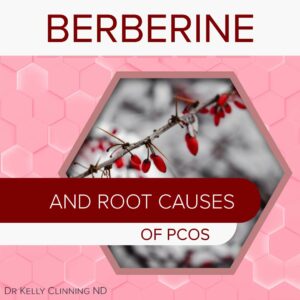Berberine and Root Causes of PCOS
Understanding which supplements are going to help reduce your PCOS symptoms can be overwhelming. There is a plethora of information and marketing targeting women with PCOS touting the benefits of a large range of natural options. Some are well researched evidenced-backed options while others contain combinations of low-dose vitamins and minerals that aren’t likely to be helpful. On top of this, we know that PCOS has different root causes in different individuals so a supplement that is helpful in one individual may not make any difference in another.
The first step in treatment is to understand what the root cause(s) of your PCOS symptoms are. This includes assessing for insulin resistance, inflammation, androgens, adrenal health, thyroid health and gut health. Once your PCOS drivers are identified, working with a professional to choose supplements specific to you is going to be the best option to reach your health goals.

Berberine is one of the supplements discussed a great deal in the treatment of PCOS but it’s not suitable for everyone! Let’s review how berberine may support PCOS symptoms and who it may be suitable for.
Improving Insulin Resistance
Reducing insulin resistance is the main reason berberine may be used to support PCOS symptoms. Insulin resistance plays a role in up to 70-80% of women with PCOS and contributes to symptoms of; long or missing cycles, weight gain, darkening of skin folds, sugar cravings and fatigue.
If you’re unsure if you have insulin resistance, it’s easy to assess for in blood work. Read a detailed blog on how to assess for insulin resistance here.
Berberine can reduce insulin resistance by impacting several pathways involved in insulin signalling and by promoting the healthy uptake of glucose from the blood into the tissue.
Although insulin resistance is common in PCOS, not every individual with PCOS has insulin resistance and in those individuals, berberine may not be the best option.
Lowering Androgens
Berberine has also been found to improve androgen levels in women with PCOS. High androgens can contribute to symptoms such as acne, hirsutism, hair loss and long or missing cycles.
Increasing a protein called Sex Hormone Binding Globulin (SHBG) may be one of the mechanisms by which berberine can reduce androgens. SHBG binds to free testosterone in the blood, reducing circulating levels. In PCOS, many women have low SHBG and higher levels of circulating testosterone. By increasing SHBG, berberine can lower free testosterone levels.
Other research has found that berberine may reduce androgens at the level of the ovary by suppressing androgen receptor signalling and reducing the production of androgens in the theca cells that surround an egg.
Anti-inflammatory Action
Elevated low-grade inflammation is a common finding in those with PCOS. Inflammation can increase insulin resistance and androgen production.
Berberine has been found to reduce inflammatory markers including IL-6, TNF-alpha, and CRP.
Is Berberine an option for you?
If insulin resistance is the main driver of your PCOS symptoms, berberine may be an option for you. If you don’t have insulin resistance and your root cause(s) are adrenal, thyroid or gut-driven, berberine may not be the best approach. Remember that before starting any supplement, identify what the root cause(s) of your symptoms are and make sure any treatment you start is addressing your unique needs.
It’s important to note that berberine can interfere with certain medications. Only start berberine after a proper workup and on the advice of a healthcare practitioner!
References
Zhang, S., Zhou, J., Gober, H., Leung, W. and Wang, L., 2021. Effect and mechanism of berberine against polycystic ovary syndrome. Biomedicine & Pharmacotherapy, [online] 138, p.111468. Available at: <https://www.sciencedirect.com/science/article/pii/S0753332221002535?via%3Dihub%3Chttps://eje.bioscientifica.com/view/journals/eje/145/5/579.xml>.




